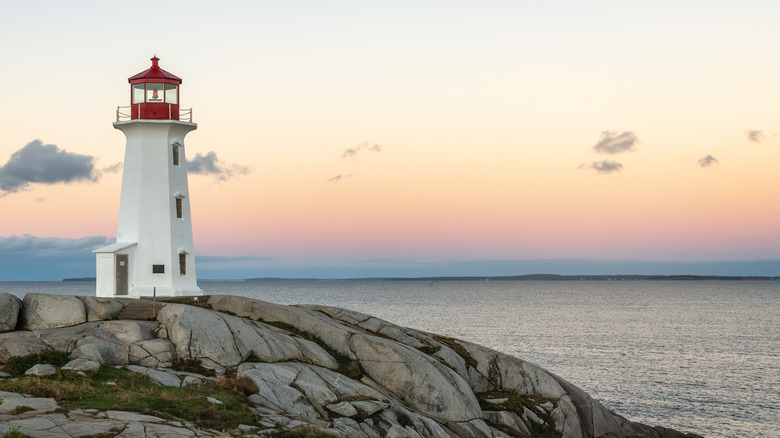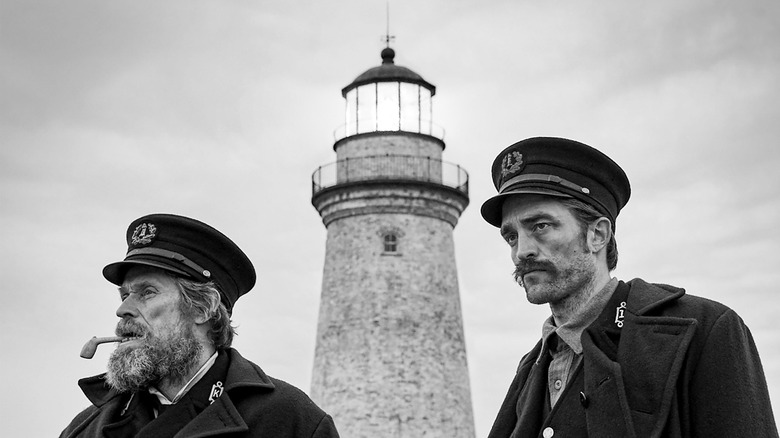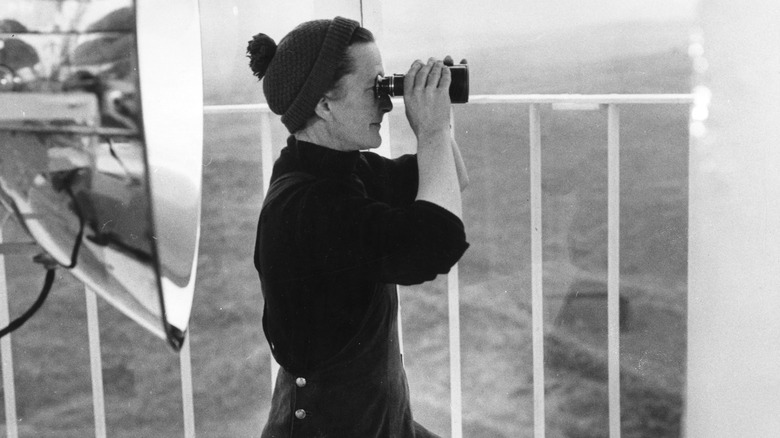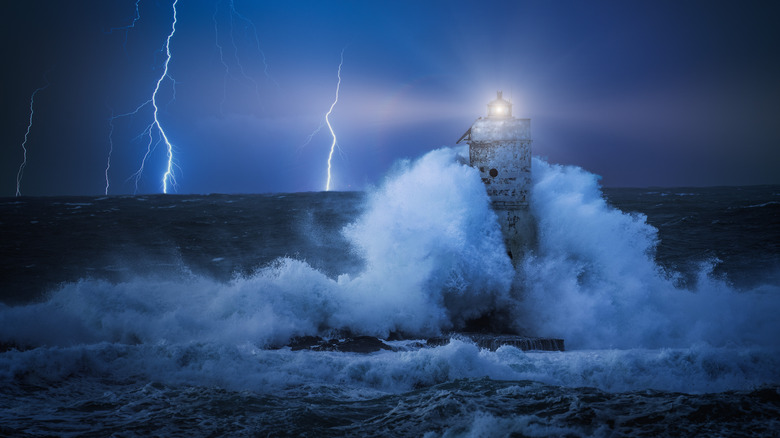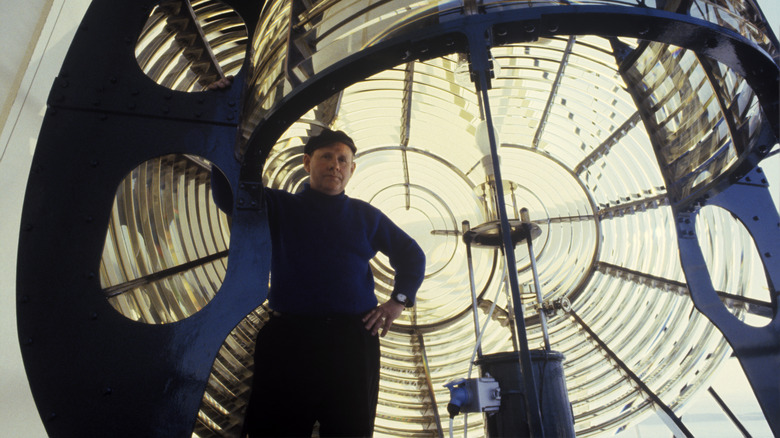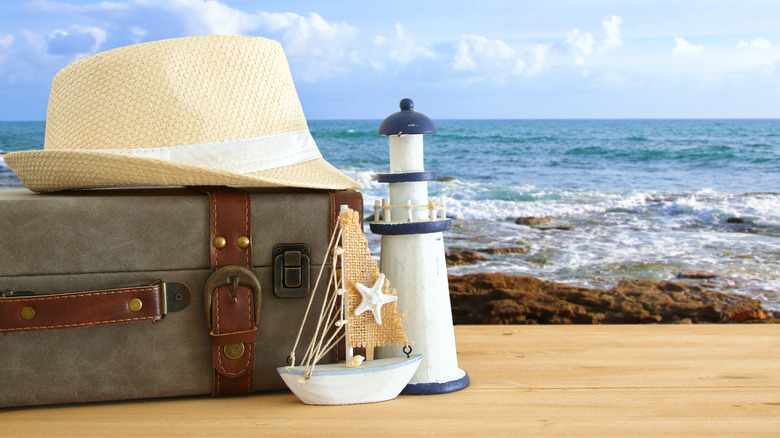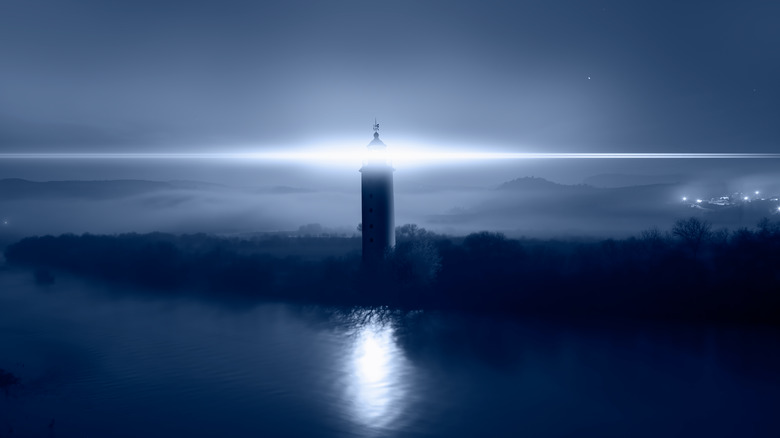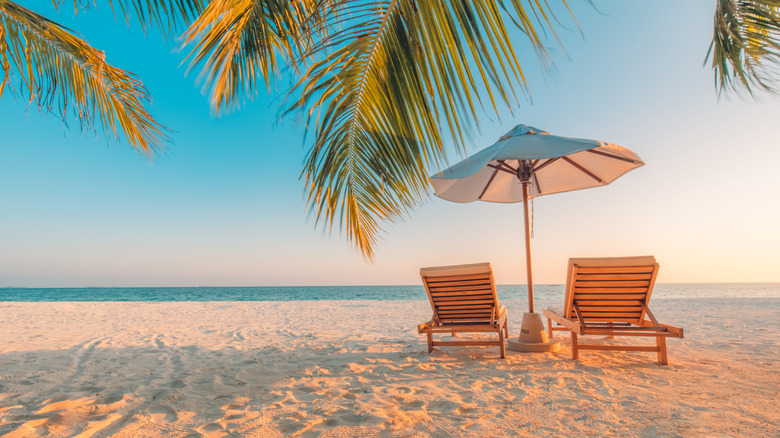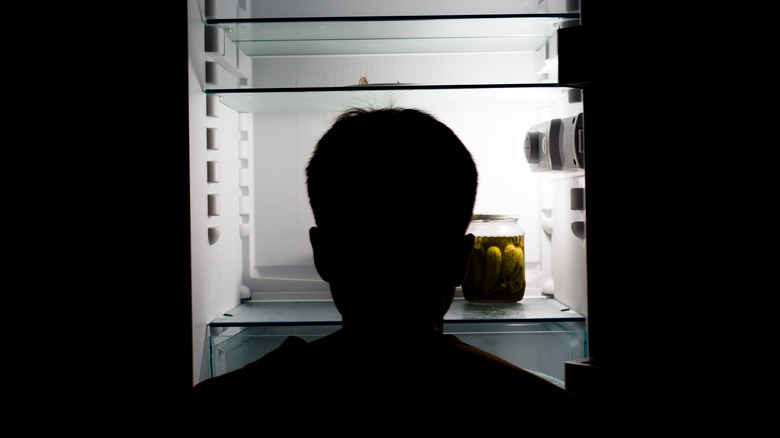What It's Really Like Being A Lighthouse Keeper
There's something about lighthouses that sparks the imagination. The isolation, their association with the sea and nature, and their iconic architecture all combine into something unique. And even if you've never been on a boat or lived in a coastal area, chances are you know more about lighthouses than you realize. That's because lighthouses are often inspiration for literature and movies.
What's remarkable about lighthouses and art is the range of stories they inspire. Some of those stories are romantic and thrilling, focusing on the beauty of the setting and the power of isolation to focus our minds and calm our emotions. But others are centered on the dark side of the lighthouse experience — how loneliness can drive you mad, and how being alone to fight the elements is a very real way to be injured or even killed.
Despite that dark side, many people have idled away some time imagining what it would be like to drop everything and become a lighthouse keeper. It could be the ultimate get-away, a way to leave the noise and drama of our lives behind and live more simply while doing important and meaningful work. As the opportunities to manage and live in a lighthouse grow smaller every year, lost to automation and a changing world, here's what it's really like being a lighthouse keeper.
You don't always live alone
The classic lighthouse setup in a story or film includes a lighthouse keeper in extreme isolation. There's an enduring image of lighthouse keepers living completely alone on a godforsaken island or spit, cut off from the world and left to their own devices. If there's more than one person living in the lighthouse, the second party is usually someone ominous and unpleasant.
The truth is somewhat different. First of all, most lighthouses are automated these days, and don't require full-time residential keepers. The Chicago Tribune explains that all functioning lighthouses in the United States have been automated for decades. The only manned lighthouse in the U.S. is Boston Light, the oldest continually used lighthouse in the U.S., which is still staffed by special Congressional order.
Many lighthouses have been converted into museums or hotels, and therefore still require a keeper or manager. But even in these cases, they rarely live in the lighthouse full-time, or at all. The Connexion reports that even at a lighthouse that is staffed year-round, the lighthouse keepers live there in shifts. At the Phare de Cordouan — the oldest lighthouse in France — five lighthouse keepers share the duties, and there are often two on duty at the same time. Some couples choose to become lighthouse keepers together, as described by CNN.
There's a lot of weather reporting, and lots of hobbies
You might think that being a lighthouse keeper mainly involves keeping the lights on and maintaining the property, and when not doing that, engaging in some serious hobbies. You'd be right about the latter — the Guardian reports that most lighthouse keepers have hobbies like knitting, or making model ships, and the Independent notes that many keepers became prolific painters and photographers. One keeper became a well-known cross-stitcher and was featured in a magazine. While general maintenance and hobbies might take up a lot of your time, you're overlooking the real main responsibility of being a lighthouse keeper: the weather.
According to CNN, some lighthouse keepers spend a lot of their time observing and reporting on the weather, filing up to seven reports every day. These reports consist of both real-time reporting to the Coast Guard and filling out log books that can be of great use to climatologists and scientists later. They can start very early in the morning, which requires good night vision and the use of binoculars to observe the water and the elements.
This can be a challenge. As the Lighthouse Keepers notes, they often have to try and observe waves and weather conditions in total darkness. This includes estimating visibility, describing the intensity of rainfall, cloud cover, wind speed, and sea conditions.
The weather can be terrifying
Being a lighthouse keeper means being exposed to the elements. While many people know what it's like to hunker down during a hurricane or other extreme weather event, it's not the same experience when you're completely alone, and when you live in a lighthouse out on a remote spot, things can get pretty scary.
The Alabama Weather Blog explains that lighthouses are very vulnerable to the high winds and powerful waves caused by extreme weather, and that they can even be swept away. That means that one of the first things a lighthouse keeper will put together is a disaster plan, which needs to be customized to the specific location and facility. Such a plan involves assessing the lighthouse and associated structures and making whatever repairs or reinforcements might be necessary, such as boarding up windows and moving supplies to upper levels in case of flooding. Flooding can be catastrophic if it affects the generator that supplies power to the lighthouse.
The Independent reports that bad weather can also delay ships, helicopters, or planes bringing supplies and communications from the mainland, or that are scheduled to take you back home — a few more days in which you're likely all alone and at the mercy of Mother Nature.
It's all maintenance, all the time
Lighthouses are usually in remote and unforgiving places, buffeted by wind and rain and waves at all times. Although usually pretty sturdy — many lighthouses have stood for a century or longer, after all — if left unattended, they would quickly fall into disrepair. So if you're imagining the life of a lighthouse keeper to be filled with free time and napping, think again: it's pretty much constant work.
Some lighthouses are part of extensive facilities — sometimes as many as a dozen separate structures, all of which have to be inspected and constantly maintained. Former lighthouse keeper Mark Sheriff notes that painting takes up a huge portion of your time when working as a lighthouse keeper, and the Lighthouse Keepers says that if you're not painting stuff, you're oiling and lubricating things to hold off rust and to keep everything functioning.
There's also the daily weather reports, landscaping duties, building steps and sheds as needed, as well as repairing your own tools, since losing a vital piece of equipment until the next supply run can be devastating. Finally, you have to do all the usual household chores such as cooking, cleaning, and laundry to survive and not live in a mess. In other words, forget about that nap.
You might have to move around a lot
These days there are fewer and fewer manned lighthouses, and the work is very different from the classic idea of keeping that enormous light on and rescuing the occasional shipwrecked sailor. Many old lighthouses have been converted into hotels or museums. As a result, the work of lighthouse keepers is often more like being the manager of a bed and breakfast or a ticket-taker and curator.
But if you do work for the government as a lighthouse keeper, you should be prepared to never get too comfortable. According to Chris Foulds, who worked as a lighthouse keeper in the United Kingdom for over 25 years, part of the job is getting posted wherever you're needed. For Chris, that meant being assigned to 32 different lighthouses over the course of his career. If you really like a spot and enjoy living there, don't get used to it, because you could be sent away at any time.
This movement is exacerbated by a lack of trained and experienced lighthouse keepers. The Financial Post explains that in Canada, which still maintains about 27 staffed lighthouses, some perceive a shortage of lighthouse keepers despite a move towards automation.
You'd better be nocturnal
Lighthouses have been the subject for numerous paintings, breathtaking photos, and frames of film over the years, because they are often located in spectacular places. But if you want to be a lighthouse keeper for the fine weather and sunny days in a gorgeous, remote spot, think again.
Lighthouse Memories explains that a lighthouse keeper's work — particularly the many weather observations they are required to make and transmit — begins in the very early morning, usually around 3 a.m., although some lighthouse keepers can get a later start depending on their location. The 3 a.m. weather report sent to the local Coast Guard station can be just the first of many, but the Coast Guard relies on these reports for the safety of vessels out on the water, so it's crucial work.
And, as the Lighthouse Keepers explains, this means lighthouse keepers spend a lot of time in the dark — sometimes several hours a day. In fact, lighthouse keepers learn not to turn on any lights when they wake up, because they need to maintain their night vision in order to observe the sea and the weather in the darkness. And of course, if you're waking up at 3 in the morning, you're probably not staying up too late, either, meaning you'd better enjoy a more nocturnal existence.
You get a lot of vacation
The old joke about teachers is that they chose their careers in order to get summer vacations off every year. Whether or not that's true, lighthouse keepers often have it even better, because they traditionally enjoy up to half the year off.
In the Independent, one lighthouse keeper recounts having to take a six-week course that taught him how to use the radio, some basic first aid, and how to properly observe the weather (plus a little bread making and other cookery). According to retired lighthouse keeper Chris Foulds, it was standard to start off with a two-month posting at a lighthouse, but after that it became one month on and one month off in order to avoid any cabin fever-inspired insanity like you see in the movies. Foulds describes the life as "blinking brilliant," noting that it translates to six months off every year.
Since many lighthouses are located in beautiful locations and offer spectacular views, life as a lighthouse keeper could be like a permanent vacation — when extreme weather, dwindling supplies, and loneliness don't ruin everything.
You deal with a lot of tourists
The classic image of a lighthouse keeper is one of a solitary soul quietly going about their business in exquisite isolation. Stories and films set in lighthouses always stress the solitude, presenting it as either maddening or soothing. But the truth is, these days you're not likely to be very lonely at all. Most lighthouses are designated as historical landmarks, and are at least part-time museums and tourist attractions. Trivia Happy explains that acting as a guide is part of many lighthouse keepers' duties.
According to former lighthouse keeper Mark Sheriff, this can lead to some stressful situations because tourists often don't realize that the lighthouse is also someone's home and private space. That can lead to folks walking in on the lighthouse keeper as they're waking up or doing other things.
The Connexion notes that some lighthouse keepers enjoy having tourists. For one thing, it's company, which can be welcome when you're doing a lonely job. For another, many lighthouses are relatively difficult to travel to, so the lighthouse keeper knows that when tourists show up they're sincerely interested and respectful of the facility.
You have to be creative with food
While the days when a lighthouse keeper would have to subsist for months on whatever food supplies were on hand are in the past, the job still requires the ability to manage and ration supplies, and to cook. There's a reason that lighthouse keepers are taught how to make bread: a distinct lack of grocery stores or pizza delivery to remote, isolated lighthouses.
Food deliveries usually come every few weeks. According to Ebonee Gregory, who actually grew up living in a lighthouse where her father was the keeper, food was delivered every two weeks, and if they ran out of something, they simply had to wait for the next drop. If there was bad weather, they'd have to wait even longer and scrounge meals together with whatever was left over.
The Lighthouse Keepers notes another challenge: no instant gratification. Having the ingredients for meals or baked goods is one thing, but if you want something, you have to make it, often from scratch. Some lighthouse keepers grow their own vegetables and fish to supplement their food supplies. One thing's for sure: there's no convenience store anywhere nearby.
Raising a family is a challenge
According to the National Park Service, it was once very common for full-time lighthouse keepers to have their families them. While it's not unheard of in modern times for lighthouse keepers to bring their families — or to start families after taking on the role — the Financial Post explains that lighthouse keepers with children are often excluded from all but the least-isolated postings, due to concerns about lack of access to emergency healthcare and other services. That means if you love your career as a lighthouse keeper, starting a family might complicate it, or even end it.
Even if you have no obstacles to starting a family or concerns about raising your kids far away from hospitals or grocery stores, there are other considerations. As Ebonee Gregory told the Guardian about her childhood experience living in a Tasmanian lighthouse where her father was keeper, she had no friends as a young child because there were literally no other children her age anywhere nearby. Further, her older brother had to be home-schooled, which was one more job to add to maintaining and repairing the lighthouse and supplying the weather reports required.
The internet connection and cell phone services stink
For many people, the idea of being isolated from fellow humans might be is appealing because they imagine a life of never-ending Netflix. But the online lifestyle requires one very important thing: a robust internet connection. And that is a rarity among lighthouses, due to their remote locations and their often primitive infrastructure. BBC Travel reports that the Punta Carena lighthouse in Italy is located in a shadow zone'without GPS, cell phone signal, or internet supply.
The Financial Post explains that internet connections are often not provided at all, and that if you want to set one up, you either have to figure out how to do it yourself, or fly in a technician at your own expense. Even if you have the skills and funds to cobble together an internet connection, according to former lighthouse keeper Caroline Woodward the end result is probably worse than dial-up.
Cell phone signals are also often spotty at lighthouses due to their remoteness. All this means that often the only way to communicate is via radio that is essentially a party line — although you can't listen in on other keepers' conversations, you have to wait for the line to clear before you can make your own call.
Salaries vary wildly
So let's say you've thought through the isolation, the hard work, the primitive conditions, and the threat of extreme weather, and you still think being a lighthouse keeper sounds like an amazing life. How much can you expect to get paid?
Well, as former lighthouse keeper Caroline Woodward reports, lighthouse keepers in Canada are the lowest-paid federal civil servants in the government. A 2018 Financial Post article says that salaries in Canada range from $38,979 to $52,304, which isn't exactly a king's ransom — though you're getting a place to stay and the basic necessities included, which can keep your cost of living down.
However, with many lighthouses being converted into hotels, there's a possibility that being a lighthouse keeper could be a little more lucrative. A 2019 article in the Guardian reports that the East Brother Light Station in San Francisco Bay was made into a bed and breakfast, and that it advertised for a lighthouse keeper who would also act as a hotel manager. The salary offered was $130,000 — a better deal than the Canadian civil service, although it was to be split between two keepers. The skill set is also a little different. Because of the lighthouse's status as a hotel, keepers are required to cook meals and do laundry for the guests, and must carry a boating license in order to make supply runs, all in addition to the endless maintenance required by a lighthouse.
